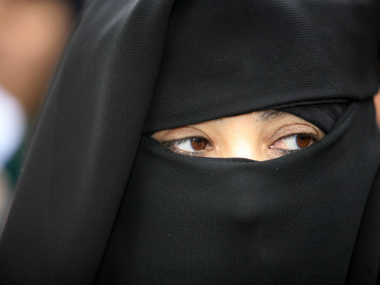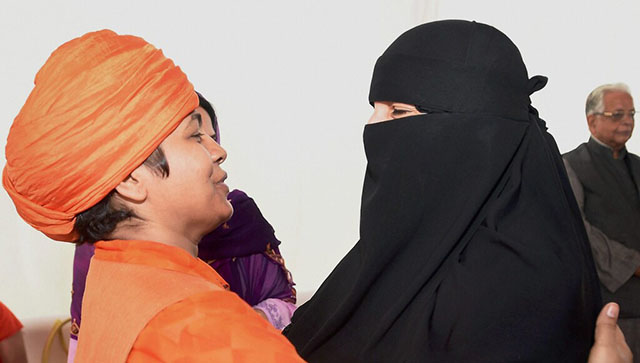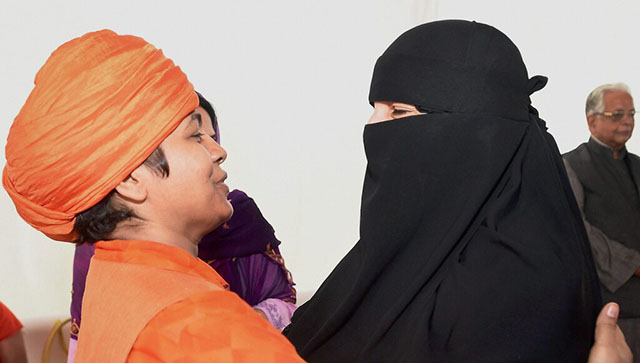When ordinary Muslim women demand legal abolition of the practice of unilateral divorce, it is not without reason. The Muslim Personal Law Board and their supporters are just not concerned with the tragic reality, where scores of Muslim women suffer tremendously owing to triple talaq. Their affidavit filed in the Supreme Court justifying triple talaq is a cruel joke steeped in sheer patriarchy. Evidently, they have no clue about the ground reality of injustice and violence in the form of triple talaq.
We were face-to-face yet again, with the reality, pain and vulnerability of young Muslim women, who have been unilaterally divorced at an emotionally-wrenching meeting in Bhopal last week. We heard heart-rending stories from Muslim women at a meeting convened by the BMMA Madhya Pradesh unit and feminist friends from Jan Pahel. The stories of about 30 women, all between the ages of 20-25, school dropouts barring one who was studying for B.Sc, some accompanied by small children, all of them unilaterally divorced and thrown out of homes by their husbands, left all of us absolutely shaken. These women came from the districts of Datia, Khargone, Chattarpur, Peepalgoan, Satna, Badwani, Bhopal and Khandwa to share their heartbreaking stories. It was remarkable that despite their horrendous ordeals they were determined to fight for justice. They wanted the practice of triple talaq to be abolished urgently.
As woman after young woman narrated her story we could see that the reasons for divorce were varied, and in some cases the women did not even know why they had been divorced. In most cases, the reasons were rather flimsy. One young woman was divorced because she did not bring enough dowry, another because she gave birth to a girl, yet another because she didn’t have a beautiful face! In almost all cases, methods of divorce were even harder to digest. One girl was divorced while she was asleep at night. When she woke up, her husband told her that while she was sleeping he had divorced her and that now she should go back to her parents’ house. One husband sent a message of divorce to his wife through her uncle (mamu). One woman was divorced right in front of her father after being beaten by a water pipe. One young wife was facing an intriguing situation as her husband had recorded an MMS clip of his wife being intimate with him; he now wants a divorce, otherwise he warns that he will make the MMS go viral.
The extent of this social malaise can be gauged from the fact that there are some villages, in which one mohalla has more than 20 girls who have been thus unilaterally divorced and are now staying with their parents, along with their children. There are families which have more than two women who have been divorced. These young women have faced tremendous violence in their marital family, even sexual violence from their husbands. The condition of some of them is really pitiable as they are not sure of their status, as they don’t accept this one-sided talaq. They have been abandoned by their husbands who refuse to take them back. On their part, each of the girls is hopeful that one day her husband will come and take her back. A very frail, differently-abled girl from a very poor background was married off to a man who already had three children; after two years now, she has been divorced. She has nowhere to go and no means to feed herself.
We could see that most of the women were angry and wanted justice. While some of the girls wanted to go back to their studies and find economic independence, many wanted to go back to their husbands. The reasons are not hard to understand. They come from poor families in a patriarchal setting where girls get stigmatised when they return home after divorce. The parents are too poor to take the girl and her children back. There are other sisters to be married off.
The most disturbing reason given by the girls was that they were not sure if the second husband will turn out to be equally cruel or not, and therefore they preferred the known one. Since there is no guarantee of happiness in the second marriage (which they said is inevitable), they might as well struggle to go back to the former husband. And that is the reason why most girls refuse to accept the unilateral divorce given by their husbands. They do not want to belong to a future where they are being married and abandoned by husband after husband with no dignity and respect at the end of the ordeal. It is also the reason why some of them (at least five) have gone to court and have insisted on going back to their husbands. Some have also filed cases of maintenance and in some instances, cases under the Prevention of Domestic Violence Act have been filed. All in the hope that the husband will be pressurised into taking her back. How they managed the lawyers’ fees was yet another story.
In almost all cases, methods of divorce were even harder to digest.
Triple talaq is not Quranic. Marriage is a social contract as per the Quran, with clear-cut verses calling for attempts at reconciliation and mediation in case of a marital discord. The Quran also emphasises the process to continue over a 90-day period. Yet, the most horrendous role is played by the local qazis and muftis as seen from the stories narrated by the women. All the women said that the unilateral divorce on the part of their husband had been approved by the local qazi. In a particular instance where even the husband was repentant and wanted to reunite, the qazi prevented him from doing so as it would amount to haramkhori. None of the qazis had tried to bring about reconciliation between the two, nor had they challenged the men’s right to instantaneous unilateral divorce. No wonder the women were annoyed and livid with the qazis, as they had been instrumental in destroying their lives.
With all the young divorced women breaking down as they shared their ordeal, it was obvious that they were undergoing tremendous emotional and psychological trauma. They were feeling humiliated and robbed of their dignity. They felt used, physically and emotionally. The violence, especially sexual violence at such a young age has left many a woman traumatised. One of them bristling with anger and humiliation said, “My husband told me take this money and go away from my life. This is the value of your person while you were with me, take it and get out of my life.” She was inconsolable, as she narrated this. It is a sad reflection of our community that a girl feels she has no choice but to go back to a person, who has not only divorced her unilaterally but also subjected her to immense physical and mental abuse.
We tried to have a discussion around why go back to such an unfair person. The vulnerability emanating from poverty and educational deprivation got highlighted. Several of them said that in their small town or village a girl has to be married and being single was unimaginable. They said that “hamara samaj ijazat nahi dega!” They feared being alone and understandably so. There is very little mobility or economic opportunities in small towns and villages, especially for a young woman. This is not to suggest that the picture is rosy in big cities.
We remain a patriarchal society and spend our lives under the stranglehold of patriarchal norms and rules. These norms demand young girls to be married off early, and to be divorced instantly as well if they are Muslim. We need to correct this power imbalance where a man continues to unilaterally divorce the wife. We need to address this common sense that a Muslim man can indulge in triple talaq as a right, and that it is up to the woman to run from pillar to post thereafter. Muslim women are entitled to legal and social justice. The women at the Bhopal meeting were expecting just that.
Noorjehan Niaz & Zakia Soman are Co-Founders of Bharatiya Muslim Mahila Andolan


)




)
)
)
)
)
)
)
)